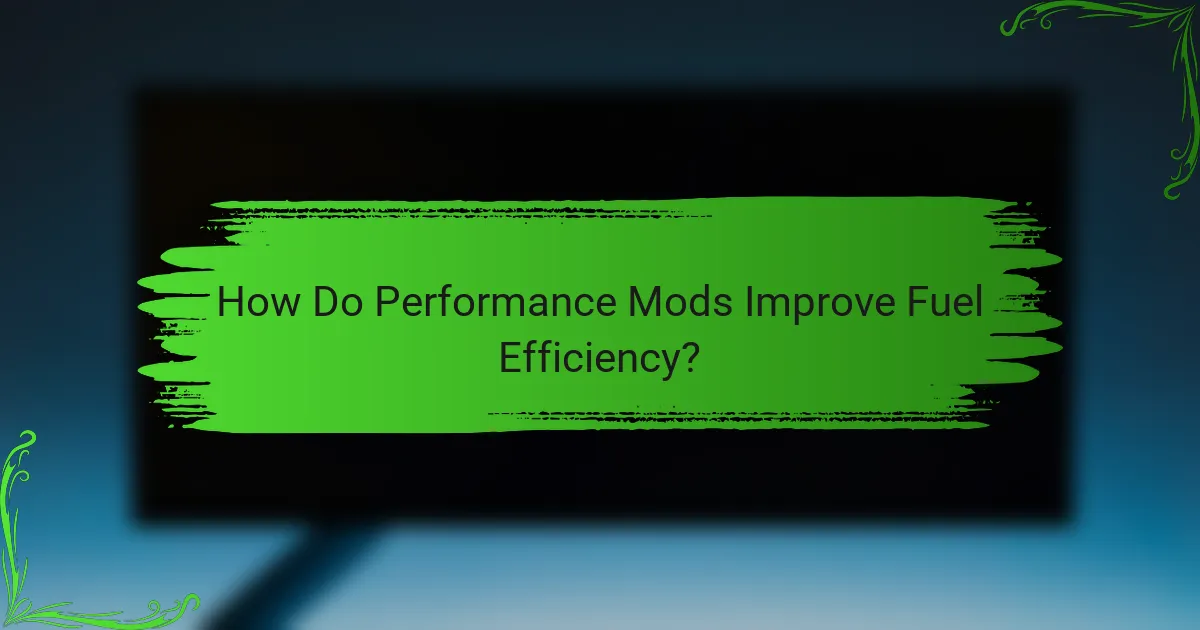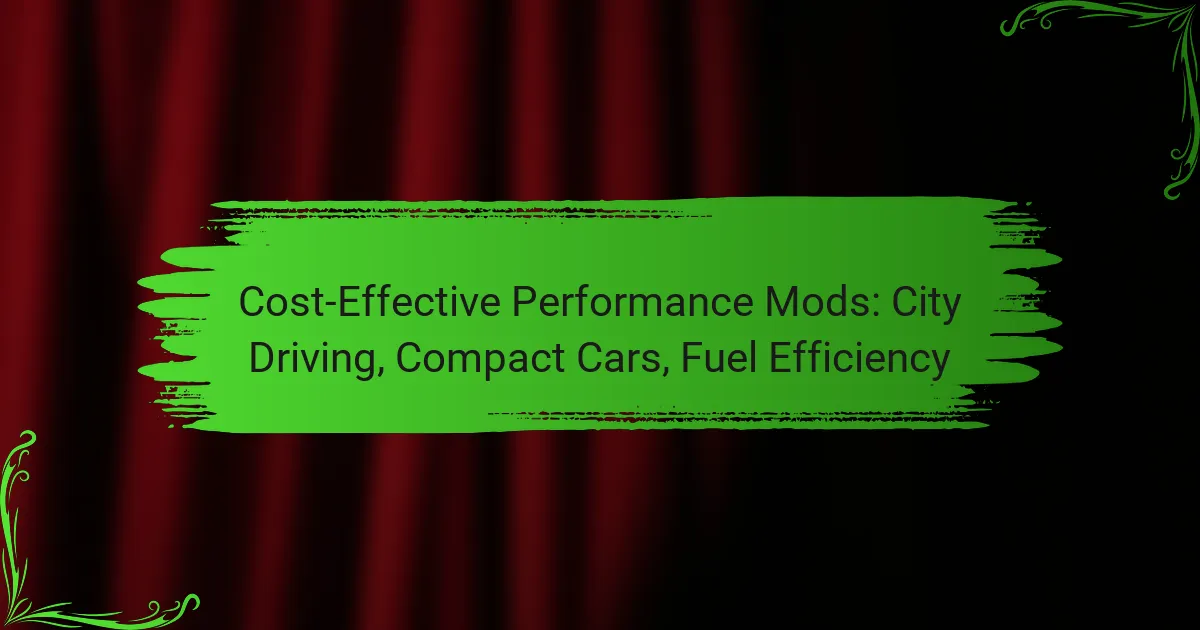For city driving, cost-effective performance modifications can significantly enhance the fuel efficiency and responsiveness of compact cars, making them more practical for everyday use. Upgrades focusing on aerodynamics, engine efficiency, and weight reduction can lead to improved mileage and a more enjoyable driving experience without compromising comfort or increasing emissions. Vehicles like the Honda Civic, Toyota Corolla, and Ford Fiesta are ideal candidates for these enhancements, allowing drivers to maximize their compact car’s potential.

What Are the Best Performance Mods for City Driving?
The best performance modifications for city driving focus on enhancing fuel efficiency and responsiveness while maintaining practicality. These upgrades can improve your compact car’s performance without sacrificing comfort or increasing emissions significantly.
Cold Air Intake Systems
Cold air intake systems improve engine efficiency by allowing cooler, denser air to enter the engine. This modification can lead to better combustion, resulting in increased horsepower and improved fuel economy, especially beneficial for city driving where stop-and-go traffic is common.
When considering a cold air intake, look for systems that are compatible with your vehicle model and check for any local regulations regarding modifications. Installation is often straightforward, making it a popular choice for DIY enthusiasts.
Performance Exhaust Systems
Performance exhaust systems enhance engine output by reducing back pressure, allowing exhaust gases to exit more freely. This can lead to a noticeable increase in power and a more aggressive sound, which many drivers find appealing.
For city driving, choose a system that balances performance with noise levels, as excessive noise can be a nuisance in urban environments. Look for options that comply with local noise regulations to avoid fines.
ECU Remapping
ECU remapping involves reprogramming your vehicle’s engine control unit to optimize performance parameters. This modification can improve throttle response and fuel efficiency, making your compact car more agile in city traffic.
Before proceeding with ECU remapping, ensure that you select a reputable tuner who understands your vehicle’s specific needs. Be aware that some remaps may void warranties or violate local emissions standards.
Lightweight Wheels
Upgrading to lightweight wheels reduces unsprung weight, improving handling and acceleration. This is particularly advantageous in city driving, where quick maneuvers are often necessary.
When choosing lightweight wheels, consider materials such as aluminum or magnesium for the best performance. Ensure that the new wheels are compatible with your tires and braking system to maintain safety and efficiency.
Upgraded Brake Pads
Upgraded brake pads enhance stopping power and reduce brake fade, which is crucial for city driving with frequent stops. High-performance pads can improve responsiveness and safety, especially in heavy traffic conditions.
Look for brake pads that offer a balance between performance and noise levels, as some high-performance options can be noisier than standard pads. Regularly check for wear and replace them as needed to maintain optimal braking performance.

How Do Performance Mods Improve Fuel Efficiency?
Performance modifications can enhance fuel efficiency by optimizing how a vehicle operates, leading to better mileage and reduced fuel consumption. These improvements often focus on aerodynamics, engine efficiency, and weight reduction, which collectively contribute to a more economical driving experience.
Enhanced Aerodynamics
Improving a vehicle’s aerodynamics reduces drag, allowing it to cut through the air more efficiently. Modifications such as adding a front splitter, rear spoiler, or side skirts can help streamline airflow, which can lead to fuel savings, particularly at higher speeds. For compact cars often used in city driving, even small changes can yield noticeable benefits.
Consider using aftermarket parts designed specifically for your vehicle model to ensure compatibility and effectiveness. A well-designed aerodynamic kit can improve fuel efficiency by several percentage points, depending on driving conditions.
Improved Engine Efficiency
Enhancing engine efficiency involves tuning the engine for better performance and fuel consumption. This can include upgrading the air intake system, exhaust system, or engine control unit (ECU) remapping. These modifications help the engine burn fuel more completely, which can lead to improved mileage.
For example, a high-flow air filter can increase airflow to the engine, while a performance exhaust can help expel exhaust gases more effectively. Together, these changes can improve fuel efficiency by around 5-10% under optimal conditions.
Weight Reduction
Reducing a vehicle’s weight can significantly enhance fuel efficiency, as lighter cars require less energy to accelerate and maintain speed. Common methods include replacing stock parts with lighter materials, such as carbon fiber or aluminum, and removing unnecessary components.
For instance, swapping out a heavy factory exhaust for a lighter aftermarket version can help shave off weight. Aim for a weight reduction of 5-15% to see a tangible impact on fuel consumption, especially in compact cars used for city driving.

Which Compact Cars Benefit Most from Mods?
Compact cars like the Honda Civic, Toyota Corolla, and Ford Fiesta are particularly well-suited for performance modifications due to their lightweight design and efficient engines. These vehicles can see significant improvements in fuel efficiency and overall driving experience with the right upgrades.
Honda Civic
The Honda Civic is one of the most popular compact cars for modifications, thanks to its robust aftermarket support. Upgrades such as cold air intakes, performance exhaust systems, and ECU tuning can enhance horsepower and torque, often resulting in a 10-20% increase in performance.
When considering modifications, focus on parts that improve fuel efficiency without sacrificing power. For instance, lightweight wheels can reduce overall weight, improving both acceleration and fuel economy. Always check local regulations to ensure compliance with emissions standards.
Toyota Corolla
The Toyota Corolla, known for its reliability, can also benefit from performance mods, though the options may be more limited compared to the Civic. Simple upgrades like a high-flow air filter or a cat-back exhaust can provide noticeable improvements in throttle response and sound.
For those looking to enhance fuel efficiency, consider a tune that optimizes the engine’s air-fuel mixture. This can lead to better mileage, especially in city driving conditions. Ensure any modifications align with warranty terms and local emissions laws.
Ford Fiesta
The Ford Fiesta is a fun-to-drive compact that responds well to performance enhancements. Upgrades such as a turbocharger kit or a sport suspension can significantly improve handling and acceleration, making it a favorite among enthusiasts.
When modifying a Fiesta, prioritize upgrades that enhance driving dynamics, such as sway bars or performance tires. These changes can improve cornering stability and overall driving enjoyment. Keep in mind that some modifications may require additional tuning to maintain optimal performance and efficiency.

What Are the Costs of Performance Mods?
The costs of performance modifications for compact cars can vary widely based on the type of upgrades and the vehicle model. Generally, you can expect to spend anywhere from a few hundred to several thousand dollars, depending on parts and installation.
Average Prices for Parts
Performance parts for compact cars typically range from $100 to $1,500. Common upgrades include air intakes, exhaust systems, and ECU tuning chips. For example, a quality cold air intake might cost around $250, while a performance exhaust system could be priced between $500 and $1,000.
When selecting parts, consider brands known for reliability and compatibility with your vehicle. Researching user reviews and expert recommendations can help you make informed choices.
Installation Costs
Installation costs can add significantly to your total expenses, often ranging from $50 to $150 per hour for labor. Simple upgrades, like air filters, can often be done at home, while more complex modifications, such as turbochargers, may require professional installation.
It’s advisable to get quotes from multiple mechanics or performance shops to ensure you’re getting a fair price. Some shops may offer package deals for multiple mods, which can save you money.
Long-Term Savings on Fuel
Investing in performance mods can lead to long-term savings on fuel, especially if you focus on enhancing fuel efficiency. Upgrades like ECU tuning and lightweight components can improve your car’s miles per gallon (MPG) by a noticeable margin.
While the initial investment might be high, many drivers find that improved fuel efficiency can offset costs over time. For instance, a modest increase in MPG could save you hundreds of dollars annually, depending on your driving habits and fuel prices.

What Should You Consider Before Modifying Your Car?
Before modifying your car, it’s essential to evaluate compatibility, local regulations, and warranty implications. These factors can significantly impact performance, legality, and your investment’s overall value.
Compatibility with Existing Systems
Ensuring that modifications are compatible with your car’s existing systems is crucial for optimal performance. For instance, upgrading the exhaust system may require adjustments to the engine management system to avoid issues like reduced efficiency or increased emissions.
Check manufacturer specifications and consult with professionals to confirm that any new parts will work harmoniously with your vehicle. This can prevent costly repairs down the line and ensure that your modifications enhance rather than hinder performance.
Local Regulations and Emissions Standards
Local regulations and emissions standards can vary significantly by region, affecting what modifications are permissible. In many urban areas, stricter emissions laws may limit the types of performance upgrades you can legally implement.
Before making any changes, research your local laws regarding vehicle modifications. For example, in the European Union, vehicles must comply with Euro emissions standards, while in the U.S., regulations can differ by state. Non-compliance can lead to fines or the inability to pass vehicle inspections.
Warranty Implications
Modifying your car can void its warranty, particularly if the changes affect critical components like the engine or transmission. Manufacturers often have specific clauses that outline how modifications impact warranty coverage.
To protect your investment, review your warranty terms before proceeding with any modifications. If you’re unsure, consider consulting with your dealership or a legal expert to understand the potential risks involved. In some cases, aftermarket parts may come with their own warranties, which can provide additional coverage if installed correctly.

How to Choose the Right Mods for Your Needs?
Selecting the right performance modifications for city driving in compact cars focuses on enhancing fuel efficiency while maintaining practicality. Prioritize mods that improve engine efficiency, reduce weight, and optimize aerodynamics to achieve the best results in urban environments.
Performance Chips and Tuners
Performance chips and tuners can significantly enhance your compact car’s fuel efficiency and power output. These devices adjust the engine’s parameters to optimize performance for city driving, often resulting in better throttle response and increased miles per gallon.
When choosing a chip or tuner, consider compatibility with your vehicle model and the specific gains you seek. Look for options that allow for easy installation and can be reverted back to stock settings if needed.
Lightweight Wheels and Tires
Upgrading to lightweight wheels can improve your compact car’s handling and fuel efficiency. Lighter wheels reduce the overall weight of the vehicle, which can lead to better acceleration and braking performance, particularly in stop-and-go city traffic.
When selecting wheels, aim for a size that fits your car’s specifications while also considering tire options that offer low rolling resistance. This combination can enhance fuel economy without sacrificing ride quality.
Cold Air Intakes
A cold air intake system can help your engine breathe better, leading to improved performance and fuel efficiency. By drawing in cooler air, these systems can increase horsepower and torque, which is beneficial for city driving where quick acceleration is often necessary.
Choose a cold air intake that is specifically designed for your vehicle model to ensure optimal fit and performance. Installation is usually straightforward, making it a popular mod for many compact car owners.
Exhaust Upgrades
Upgrading your exhaust system can enhance engine performance and fuel efficiency by improving exhaust flow. A less restrictive exhaust allows the engine to expel gases more efficiently, which can lead to better acceleration and potentially improved fuel economy.
Consider options like cat-back exhaust systems that are designed for your compact car. These upgrades can provide a sportier sound while also delivering performance benefits in urban driving conditions.
Weight Reduction Techniques
Reducing weight is a crucial aspect of enhancing performance for city driving in compact cars. Lighter vehicles require less energy to accelerate and can improve fuel efficiency, making weight reduction mods highly effective.
Common techniques include removing unnecessary interior components, opting for lighter materials for body parts, or replacing heavy batteries with lightweight alternatives. Always balance weight reduction with safety and comfort considerations.
